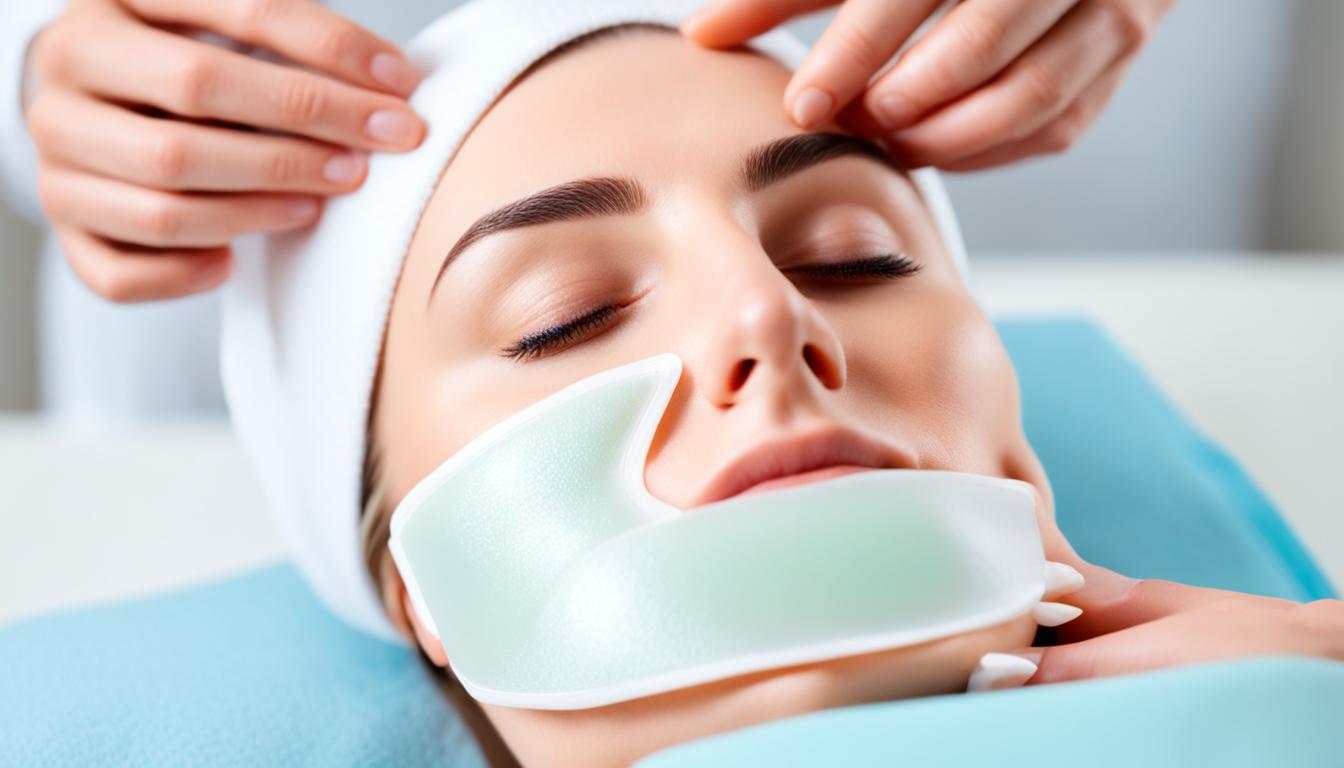Are you experiencing a swollen eyelid and looking for quick relief? You’re in the right place! Swollen eyelids can be uncomfortable and sometimes alarming, but there are effective treatments and remedies available. Whether your swollen eyelid is caused by allergies, an infection, or injury, we have some helpful tips to speed up the healing process.
Before trying any remedies, it’s important to consult an eye doctor for a professional assessment. They can diagnose the underlying cause of your swollen eyelid and provide appropriate treatment. However, if you’re looking for some immediate relief, here are a few quick tips to consider:
- Antihistamines: If allergies are the culprit behind your swollen eyelid, taking an antihistamine or using antihistamine eye drops can help reduce the swelling.
- Cold Compress: Applying a cold compress to the affected area can provide temporary relief by reducing inflammation.
- Remove Contact Lenses: If you wear contact lenses, it’s best to remove them until the swelling subsides. This will prevent further irritation and allow your eye to heal.
- Elevate Your Head: Sleeping with your head slightly elevated can help prevent fluid from pooling in your face, reducing swelling.
Remember, these tips are meant to provide temporary relief while you seek professional care. If the swelling persists or is accompanied by other symptoms, it’s crucial to consult an eye doctor for proper diagnosis and treatment. They can guide you on the best course of action to heal your swollen eyelid.
What is the Fastest Way to Heal a Swollen Eyelid?
When dealing with a swollen eyelid, finding fast relief is crucial. Here are a few simple home remedies to help reduce swelling and promote healing:
1. Apply a Cool Compress or Chilled Tea Bag
Applying a cool compress or a chilled tea bag to the affected eyelid can help alleviate swelling. The cool temperature can constrict blood vessels, reducing inflammation and soothing the area.
2. Use Saline Rinses
Clear away crust and discharge by using saline rinses. These rinses can help cleanse the eyelid and provide relief from discomfort caused by swelling.
3. Avoid Eye Makeup and Contact Lenses
While experiencing swollen eyelid symptoms, it is best to avoid wearing eye makeup and contact lenses. These products can further irritate the eye and prolong the healing process.
4. Try Over-the-Counter Artificial Tears
Keep your eyes moist and comfortable by using over-the-counter artificial tears. These eye drops can help alleviate dryness and provide relief from swelling.
5. Consider Antihistamine Eye Drops
If allergies are the cause of your swollen eyelid, antihistamine eye drops may provide relief. These drops can help reduce allergy symptoms, including swelling and itchiness.
6. Elevate Your Head at Night
Decrease fluid retention by elevating your head while sleeping. This position can help prevent excess fluid from pooling around the eyes, reducing swelling.
If these home remedies fail to improve the swelling after a few days, it is recommended to seek medical attention for further evaluation and treatment.
Remember, everyone’s situation is unique, and it’s important to consult with a healthcare professional for a proper diagnosis and guidance regarding your specific case.
Swollen Eyelid Causes and Solutions
Swollen eyelids can be caused by various factors, including allergies, infection, trauma or injury, fluid retention, lack of sleep, or underlying medical conditions. Proper care for swollen eyelids involves addressing the root cause and implementing suitable solutions.
Common Causes of Swollen Eyelids
- Allergies: Allergic reactions to allergens such as pollen, dust, or pet dander can lead to swollen eyelids.
- Infection: Bacterial or viral infections, such as conjunctivitis or styes, can cause eyelid swelling.
- Trauma or Injury: Eyelid trauma, such as getting hit or scratched, can result in swelling.
- Fluid Retention: Fluid buildup in the eyelids, often due to factors like hormonal changes or high sodium intake, can cause swelling.
- Lack of Sleep: Insufficient sleep can lead to fluid accumulation and puffiness in the eyelids.
- Underlying Medical Conditions: Certain medical conditions like thyroid disorders, kidney problems, or autoimmune diseases can contribute to swollen eyelids.
Solutions for Swollen Eyelids
To care for swollen eyelids, it’s important to address both the symptoms and the underlying cause. Here are some solutions:
- Apply a Compress: Using a cold or warm compress can help reduce swelling and soothe the eyelids. Alternating between cold and warm compresses can provide additional relief.
- Gentle Cleaning: Gently washing the eyelids with a diluted solution of baby shampoo or saline can help remove any irritants and keep the area clean.
- Avoid Eye Makeup and Contact Lenses: Temporarily refrain from using eye makeup and contact lenses to prevent further irritation and allow the eyelids to heal.
- Keep Eyes Moist: Using lubricating eye drops or artificial tears can help keep the eyes moist and alleviate discomfort caused by dryness.
- Identify and Treat Underlying Causes: If the swelling persists or recurs, it’s important to consult an eye doctor or healthcare professional to determine and address any underlying medical conditions causing the swollen eyelids.
In more severe cases or when the swelling is accompanied by severe pain, vision changes, or other concerning symptoms, seeking prompt medical attention is crucial.
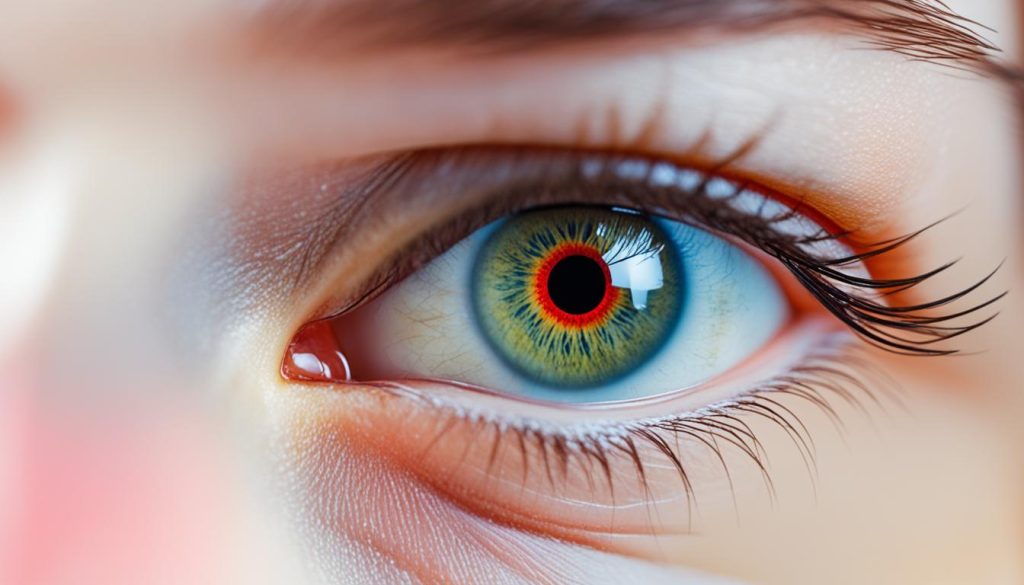
When to Seek Medical Help for a Swollen Eyelid?
While most cases of swollen eyelids can be treated at home, there are instances where medical help should be sought. If the swelling doesn’t improve within 24 to 48 hours or if it worsens, it’s important to contact a healthcare professional.
Emergency symptoms that require immediate medical attention include:
- Severe pain
- Blurry vision
- Vision changes
- Inability to move the eye normally
- High temperature
- Nausea
- Dizziness
- Confusion
- Double vision
If any of these symptoms occur alongside a swollen eyelid, it’s crucial to seek medical care promptly. It’s also essential to seek medical attention for children with swollen eyelids to address the underlying cause and provide appropriate treatment.
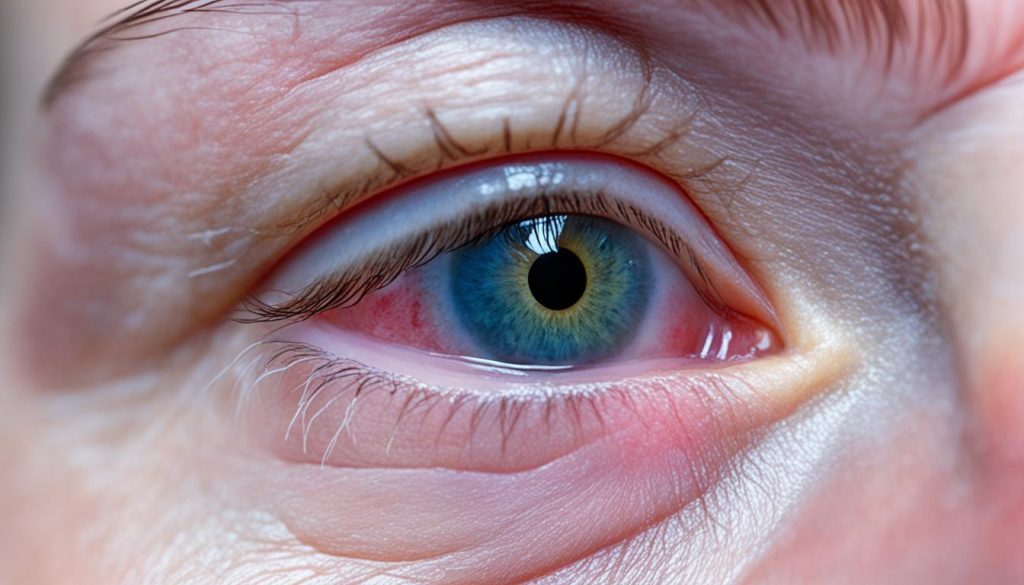
Swollen Eyelid in Children – Causes and Home Remedies
Swollen eyelids in children can occur due to various factors, including rubbing the eyes, insect bites near the eye, contact dermatitis, or exposure to eye irritants. While most cases can be managed at home, it’s essential to identify the underlying cause and seek medical attention if the swelling is severe, accompanied by certain symptoms, or doesn’t improve within a week.
Possible Causes of Swollen Eyelid in Children
Swollen eyelids in children can be caused by:
- Eye rubbing: Persistent rubbing of the eyes can lead to irritation and swelling.
- Insect bites: Bites near the eye area can cause localized inflammation and swelling.
- Contact dermatitis: Allergic reactions to substances like makeup or skincare products can result in swollen eyelids.
- Eye irritants: Exposure to chemicals, pollutants, or smoke can cause eye irritation and subsequent swelling.
To understand the cause of swollen eyelids in children, it’s important to observe any accompanying symptoms and consult a healthcare professional if necessary.
Home Remedies for Swollen Eyelids in Children
Several home remedies can provide relief for swollen eyelids in children:
| Home Remedies | Description |
|---|---|
| Applying a Cold Pack | Place a cold compress or a clean cloth soaked in cold water on the affected eyelid for a few minutes to reduce swelling. |
| Giving Allergy Medicine or Antihistamines | If allergies are suspected as the cause, administering age-appropriate allergy medicine or antihistamines can help alleviate the swelling. |
| Using Vasoconstrictor Eye Drops | If the swelling affects vision or persists, vasoconstrictor eye drops may be recommended by a healthcare professional to reduce the swelling. |
These home remedies can provide temporary relief, but if the swelling is severe, accompanied by severe symptoms, or doesn’t improve within a week, it’s important to seek emergency medical care or consult a healthcare professional for proper diagnosis and treatment.
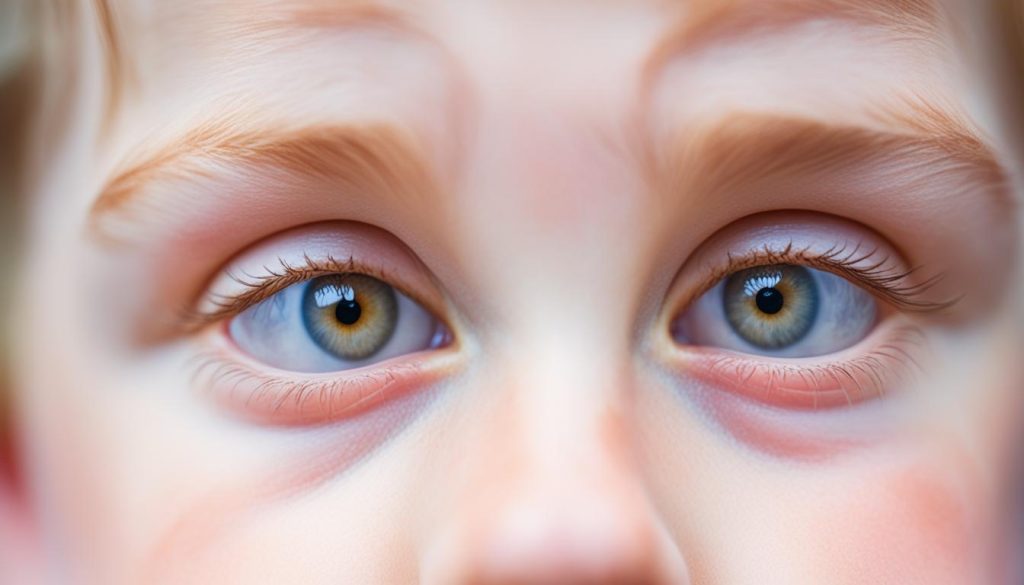
The Importance of Proper Eyelid Care
Proper eyelid care is crucial for maintaining healthy eyes and preventing conditions that can cause eyelid swelling. By following a few simple steps, you can keep your eyelids clean and free from irritation.
1. Regular Cleaning
One of the key aspects of eyelid care is regular cleaning. You can clean your eyelids by gently washing them with warm water and diluted baby shampoo. This helps remove crust and oil buildup, preventing blockage of the oil glands in the eyelids.
2. Avoiding Eye Makeup and Contact Lenses
While experiencing symptoms of eyelid swelling, it is advisable to avoid using eye makeup and wearing contact lenses. Eye makeup can introduce bacteria and irritants, while contact lenses can further aggravate the inflammation. By giving your eyes a break from these products, you allow them to heal more effectively.
3. Using Artificial Tears
If you are prone to dry eyes or experiencing discomfort, using artificial tears can help keep your eyes moist and comfortable. These lubricating eye drops can alleviate dryness and reduce the risk of eyelid inflammation. Make sure to choose artificial tears specifically formulated for your type of dry eye.
4. Practicing Good Sleep Habits
Getting enough restful sleep is essential for overall eye health. When you sleep, fluid can accumulate in your face, including the eyelids. By practicing good sleep habits, such as sleeping with your head elevated, you can prevent fluid from settling in your face and causing eyelid swelling.
5. Protecting Your Eyes
Protecting your eyes from irritants and allergens is another important aspect of eyelid care. Avoid exposure to smoke, dust, and other airborne particles that can trigger inflammation. If you have known allergies, take necessary precautions to minimize exposure to allergens.
6. Regular Eye Examinations
Regular eye examinations by an eye doctor are crucial for maintaining optimal eye health. Eye exams can detect any underlying conditions that may contribute to eyelid swelling. By addressing these conditions early on, you can prevent further complications and ensure proper treatment.
By incorporating these practices into your daily routine, you can effectively care for your eyelids and promote healthy, comfortable eyes.
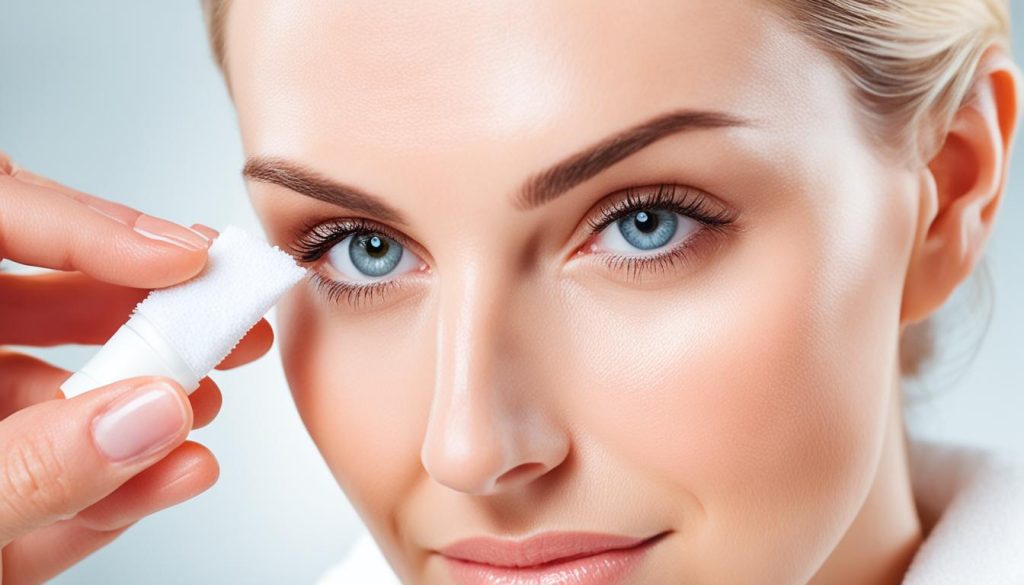
Conclusion
When dealing with a swollen eyelid, there are various remedies and tips that can provide relief. However, it is crucial to seek professional medical advice for an accurate diagnosis and appropriate treatment. Home remedies like applying a cold compress, using eye drops, and practicing good eyelid care can help reduce swelling and promote healing.
While these remedies can offer temporary relief, it is important to address the underlying cause of the swollen eyelid. If the swelling persists or is accompanied by severe symptoms such as severe pain, blurry vision, or high temperature, it is essential to seek medical attention for proper care and management.
In conclusion, swollen eyelids can be discomforting, but with the right treatment and care, relief is possible. From seeking professional help to taking care of your eyelids at home, it is important to prioritize your eye health. By following these tips and remedies, you can find the swollen eyelid relief that you need.
FAQ
1. What is the Fastest Way to Heal a Swollen Eyelid?
To quickly treat a swollen eyelid, it’s best to see an eye doctor for a professional assessment and effective treatment. Taking an antihistamine or using antihistamine eye drops can help reduce swelling caused by allergies. Removing contact lenses and applying a cold compress can also provide relief.
2. How to Reduce Swollen Eyelid Fast?
To reduce a swollen eyelid quickly, applying a cool compress or a chilled tea bag can help relieve swelling. Saline rinses can be used to clear away crust and discharge. It’s important to avoid wearing eye makeup and contact lenses while experiencing symptoms. Using over-the-counter artificial tears can keep the eyes moist and comfortable, and antihistamine eye drops can provide relief for allergies. Elevating the head at night can help decrease fluid retention.
3. What are the Causes and Solutions for Swollen Eyelids?
Swollen eyelids can be caused by various factors, including allergies, infection, trauma or injury, fluid retention, lack of sleep, or underlying medical conditions. Proper care for swollen eyelids involves applying a compress, gently washing the area with diluted baby shampoo or saline solution, avoiding eye makeup and contact lenses, and using eye drops to keep the eyes moist. It’s important to identify the cause of the swelling to determine the appropriate treatment. In some cases, medical attention may be necessary to address the underlying condition causing the swollen eyelids.
4. When should I Seek Medical Help for a Swollen Eyelid?
While most cases of swollen eyelids can be treated at home, there are instances where medical help should be sought. If the swelling doesn’t improve within 24 to 48 hours or if it worsens, it’s important to contact a healthcare professional. Emergency symptoms that require immediate medical attention include severe pain, blurry vision, vision changes, inability to move the eye normally, high temperature, nausea, dizziness, confusion, or double vision. It’s also essential to seek medical care for children with swollen eyelids to address the underlying cause and provide appropriate treatment.
5. What are the Causes and Home Remedies for Swollen Eyelid in Children?
Swollen eyelids in children can be caused by factors such as rubbing the eyes, insect bites near the eye, contact dermatitis, or eye irritants. Home remedies for swollen eyelids in children include applying a cold pack, giving allergy medicine or antihistamines, and using vasoconstrictor eye drops for swelling that affects vision. However, if the swelling is severe, accompanied by certain symptoms, or doesn’t improve within a week, it’s important to seek emergency medical care or consult a healthcare professional for proper diagnosis and treatment.
6. Why is Proper Eyelid Care Important?
Proper eyelid care is crucial for maintaining healthy eyes and preventing conditions that can cause eyelid swelling. This care includes regularly cleaning the eyelids with warm water and diluted baby shampoo to remove crust and oil buildup. Avoiding eye makeup and contact lenses while experiencing symptoms is also recommended. Using artificial tears to keep the eyes moist and comfortable, practicing good sleep habits, and protecting the eyes from irritants and allergens can help prevent eyelid swelling. Regular eye examinations by an eye doctor can also ensure early detection and treatment of any underlying conditions.
7. What are some Quick Tips for Swollen Eyelid Relief?
While swollen eyelids can be a bothersome symptom, there are several quick tips and remedies that can provide relief. Seeking professional medical advice is important for an accurate diagnosis and appropriate treatment. Home remedies such as applying a compress, using eye drops, and practicing good eyelid care can help reduce swelling and promote healing. However, if the swelling persists or is accompanied by severe symptoms, it’s crucial to seek medical attention to ensure proper care and management of the underlying cause of the swollen eyelid.

